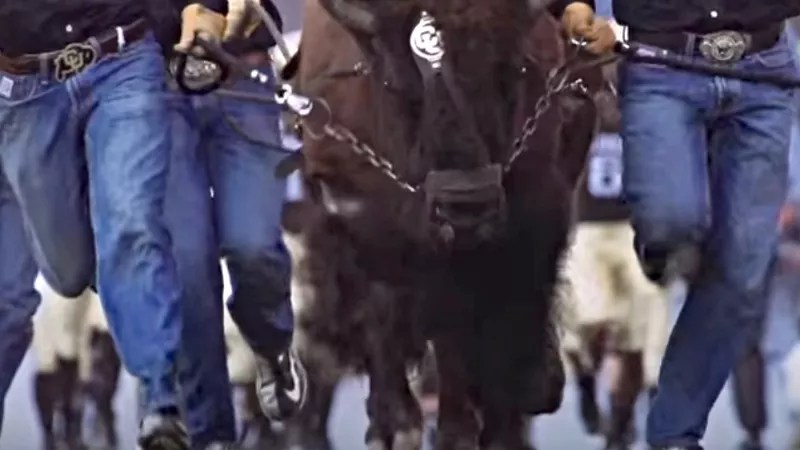
University of Colorado Boulder via YouTube

Audio By Carbonatix
A new lawsuit filed against the University of Colorado Boulder is attempting to force the institution to divulge details about huge multimedia sports deals currently hidden from public view because they’re the purview of its athletic-rights partner, technically a private institution – albeit one that just happens to have its address at Folsom Field, CU Boulder’s football stadium.
“We’re talking about millions of dollars of business involving the university using public assets like facilities that’s largely done in secret,” says journalist Daniel Libit of The Intercollegiate, a vibrant website that takes a hard-news approach to covering college sports.
As proof of this contention, Libit points to CU Boulder’s controversial $1.625 million contract with PointsBet, an online gambling operation, which only became public after Libit threatened to sue in order to get a look at it. In early October, just before he planned to file, CU Boulder released the document to both The Intercollegiate and Sports Illustrated, with the latter publishing first and reaping the pageview benefits of Libit’s enterprise.
In that case, Libit says CU Boulder capitulated because it was in physical possession of the PointsBet contract – but that’s not standard operating procedure. Generally, documentation remains in the hands of Buffalo Sports Properties, a branch of Learfield Communications, a Dallas-based concern that works with universities around the country. “As exclusive athletics multimedia rightsholder,” the BSP web page states, “Buffalo Sports Properties manages all aspects of the rights relationship including venue signage; event sponsorships and promotion; corporate hospitality; television; digital engagement and visibility through the official athletics website CUBuffs.com; as well as radio game broadcasts and coaches’ shows.”
Under such agreements, Libit notes, “public universities are able to claim that they’ve farmed this all out to a private company.”
To open up the deals to scrutiny, Libit filed suit in Boulder County District Court under the auspices of an LLC called Scrutiny Is Unity on December 2, arguing that specific Buffalo Sports Properties work product constitutes public records as defined by the Colorado Open Records Act. A key passage reads: “If the records reveal what is fairly and reasonably implied by the circumstances, that they were made, maintained, or kept for the function of conducting public business and are therefore ‘public records,’ Mr. Libit and Scrutiny request that the Court find that UCB has violated CORA and order the records to be released.”
In response to the suit, CU Boulder spokesperson Joshua Lindenstein states: “The university has supplied all records requested by the plaintiff that we make, maintain or keep, in compliance with the Colorado Open Records Act.” (We’ve reached out to Buffalo Sports Properties for comment, but have not heard back.)
Libit’s latest effort harks back to an earlier project. Shortly after covering the 2016 presidential election for CNBC, he launched nmfishbowl.com, which focused entirely on the athletic department at the University of New Mexico. Over the next two years, Libit filed multiple public-records lawsuits against the university, including a complaint that he describes as “almost identical to the one I’ve just filed against the University of Colorado,” targeting multimedia rights documents.
Another similarity: Lobo Sports Properties, UNM’s equivalent of Buffalo Sports Properties, is also owned by Learfield. “In that case,” Libit recalls, “we settled before it went to trial, with the university agreeing that all of their multimedia rights documents would thereafter be made public and they would serve as the custodian for the multimedia rights partners that relate to the university’s multimedia rights assets.”
In 2019, Libit founded The Intercollegiate, a scrappy operation that’s earned laudatory profiles from the New York Times and National Public Radio. Since then, he’s used techniques he developed at nmfishbowl.com on a broader scale – and because of Colorado’s strong public-records laws, he’s hopeful that the university won’t be able to stonewall him for long.
Do universities create relationships like the one involving Buffalo Sports Properties solely to hide big-buck transactions? “I wouldn’t see that as their primary function,” Libit maintains, “but I definitely think it’s a perceived benefit. I think the primary reason universities engage with companies like Learfield is to handle things in a way that gives them a level of certainty that they’ll be making X amount of dollars a year on their multimedia rights. There’s also a huge incentive for athletic directors to get in good with this massive company that prevails over college athletics – and it’s just the way business has been done. But from my perspective, a great disservice to the public is a consequence of these arrangements. A lot of business involving a university’s athletic department is done in secret, and we’re talking about millions and millions of dollars.”
Click to read Scrutiny Is Unity LLC v. University of Colorado Boulder.